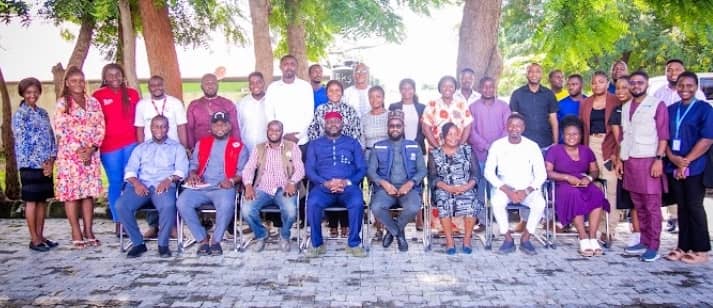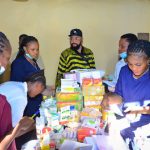…As Benue govt urges operationalization of social register
From Dooshima Terkura, Makurdi
The United Nations High Commissioner for Refugees (UNHCR), has disclosed plans to construct 500 housing units to support the relocation of Internally Displaced Persons (IDPs) in Yelewata and other communities in Benue state.
This was made known during a high-level multisectoral coordination meeting in Makurdi, the Benue state capital, convened by the Bureau for International Cooperation and Development (BICD), in partnership with Christian Aid and Ohonyeta Care Givers (OCG).
The meeting had in attendance representatives of government ministries, United Nations agencies, civil society organizations, and international development partners—including the Red Cross, World Health Organization (WHO), UNHCR, and several national and international NGOs.
Speaking on behalf of UNHCR, Mrs. Beatrice Shonke said the projects would commence once land is made available to them
She stated that a pilot initiative known as IDP farms has been established in Tyomu community, Makurdi LGA with the 15 IDP households benefitting and supported to build their homes while also working on the farms in the host community.
She said the organization also carried out a health and education assessment in Naka, Tartyo and Yelewata communities to ascertain the conditions of their schools and Primary Health Care centers to enable the agency know how to intervene especially in Tartyo where all school and health facilities were gone following the attacks.
She further expressed the willingness of UNHCR to continue to intervene in the state until IDPs are supported to go back and stand on their feet.
Welcoming participants, Director General of BICD, Leo-Angelo Viashima, reaffirmed the government’s commitment to building a coordinated, transparent, and sustainable system that aligns with global development principles.
He commended the leadership of Governor Hyacinth Alia, for providing a conducive environment for partnerships and for his strategic vision to move Benue State from humanitarian dependence toward long-term development.
“We are here not just to celebrate milestones, but to strengthen the systems that make them possible. True progress comes when government, partners, and communities work as one, identifying challenges honestly and forging inclusive, data-driven solutions that endure.”
Dr. Viashima reiterated the need to adopt and operationalize the National Social Register to ensure transparency, eliminate duplication, and improve data-driven targeting of beneficiaries.
He called on all actors to deepen collaboration and focus on durable solutions that can transition Benue from emergency response to sustainable development insisting that “Our collective success will be measured not by the number of projects we implement, but by the systems we leave behind. Sustainability must be our goal.”
The meeting was part of government efforts towards strengthening humanitarian and development coordination in Benue State, and was focused on assessing ongoing interventions, identifying operational bottlenecks, and fostering greater synergy among humanitarian and development actors in the state.
Several organizations shared updates on their ongoing initiatives across Benue State. While Sight Savers gave detailed account of it blindness prevention work in Guma and Katsina-Ala LGAs, SOAR Initiative outlined GBV prevention activities in IDP camps.
While the World Health Organization (WHO) presented its continued technical support to the Ministry of Health, including capacity-building for health workers and observances of global health days, other partners including Christian Aid, Tearfund, First Step, FJDP, and Terre des Hommes (TDH) also presented progress reports on programs spanning health, education, and livelihoods in displaced and host communities.
Despite these achievements, participants raised key challenges facing coordination efforts ranging from duplication in beneficiary targeting, unequal distribution of aids, and geographical concentration of interventions, particularly in Ortese and Daudu camps.
Stakeholders advocated for the equitable spread of assistance across all regions of the state and the integration of development-oriented projects alongside humanitarian relief.
Representing the Ministry of Humanitarian Affairs, Mr. Jeremiah Terdoo Ityokoso applauded the BICD for its leadership in training IDP camp officials and institutionalizing best practices. He emphasized the importance of aligning all interventions with the newly launched Benue State IDP Policy to promote coherence and efficiency.
The meeting reaffirmed Benue State’s growing leadership in fostering whole-of-government and whole-of-society coordination, a model increasingly recognized by partners as essential to achieving the humanitarian-development-peace nexus in Nigeria’s Middle Belt.






